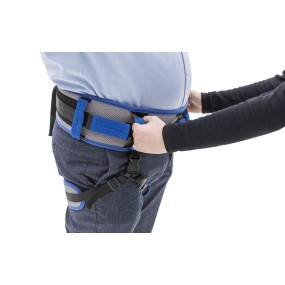Rota Stand Solo - LOCO-311
Rota Stand SOLO - LOCO-311. Designed to revolutionise sit-to-stand and pivot transfers. The patented T Bar mechanism in the base (see picture) allows a sit-to-stand and pivot transfer to be...
|
Medical Equipment
|
|
Profiling Beds
Bed Accessories
|
|
Mobility Aids
|
|
Patient Sensor Alarms
|
|
Active Pressure Care Systems
Static Foam Mattresses
Pressure Relief Cushions
|
|
Medical Scales and Measuring
|
|
Patient Moving and Handling
|
|
Patient Comfort and Care
|
|
Infection Control for Healthcare
|
|
First Aid Kits
First Aid Consumables
|
|
About us
Privacy & GDPR
Terms and conditions
Delivery Information
Rules regarding VAT exemption
|
Filter By
Price
Price
£56.00 - £57.00
Select Size
Select Size
Best sellers
Rota Stand SOLO - LOCO-311. Designed to revolutionise sit-to-stand and pivot transfers. The patented T Bar mechanism in the base (see picture) allows a sit-to-stand and pivot transfer to be...
The Locomotion Patient Turner - LOCO-501. Designed to facilitate a dignified transfer enabling a person to travel safely over short distances from one seated position to the next. Promotes safe...
Maxi-Mover Quilted Slide Sheet A full-body-length quilted cylinder with a low-friction inner surface allows patients to be transferred or repositioned without the need to lift. The MAXI-MOVER /...
Evolution Catering First Aid Point - Blue Case (Small) The Evolution Catering First Aid Point in a Blue Case is a comprehensive solution tailored for catering and food-handling environments,...
Active filters
Soft, Secure Belt for Safe and Dignified Transfers The Alerta Deluxe Support Belt with optional leg straps is designed to assist carers with safe, dignified transfers between beds, wheelchairs,...
Patient handling belts provide carers with secure grip points to assist patients with mobility or transfers, featuring padded waist belts worn by patients with integral handles enabling carers to provide support safely during sit-to-stand assistance, guided walking, stair negotiation, and repositioning activities across hospitals, care homes, rehabilitation centres, physiotherapy departments, occupational therapy services, and domiciliary care throughout England, Scotland, Wales, and Northern Ireland. These practical manual handling aids reduce the need for direct lifting whilst providing secure controlled support, serving hospital rehabilitation wards supporting early mobilisation, care homes assisting residents with partial mobility, rehabilitation centres delivering progressive independence training, physiotherapy departments conducting gait re-education, occupational therapy services teaching transfer techniques, and home care enabling safe assistance by family carers, meeting Health and Safety Executive manual handling regulations, NHS safer patient handling protocols, and supporting person-centred care across all UK care sectors.
Assisting patient mobility without appropriate equipment creates injury risks through awkward postures, inadequate grip points forcing carers to grasp clothing or patients directly, and uncontrolled movements if patients lose balance, with unsafe practices historically causing carer back injuries and patient falls across hospitals, care homes, and community care throughout the UK. Handling belts solve these problems providing secure handholds at optimal working height for carers, distributing any pulling or supporting forces safely around patient core rather than through vulnerable joints, arms, or clothing, and enabling controlled support during standing, walking, or transfers. Professional handling belts feature wide padded designs typically 10-15cm width distributing forces comfortably around patient waist, robust construction supporting patient weight during assistance, multiple handle positions enabling varied grip options and two-carer assistance, secure fastening systems including quick-release buckles enabling rapid application and removal, and washable materials supporting infection control. Some models include additional features such as leg loops preventing belt riding up, reflective strips supporting visibility, and varied sizing accommodating different patient builds. Handling belts suit patients with partial mobility who benefit from supportive assistance during activities including standing from chairs, walking practice, stair use with support, and controlled sitting throughout England, Scotland, Wales, and Northern Ireland.
Implement patient handling belts following moving and handling assessment by physiotherapists, occupational therapists, or trained staff across hospitals supporting patient rehabilitation, care homes assisting residents with moderate mobility, rehabilitation facilities delivering progressive independence programmes, and domiciliary care throughout the UK. Assessment determines suitability considering patient weight-bearing ability requiring capacity to support body weight through legs with assistance, trunk control maintaining upright posture with support, mobility goals where assisted walking promotes rehabilitation, cognitive function understanding instructions and cooperating, and transfer scenarios where handling belts appropriate including sit-to-stand assistance, supported walking, and controlled sitting. Training for carers ensures safe technique including correct belt positioning around patient waist avoiding ribcage or hips, secure fastening checking before use, appropriate grip on handles, correct body mechanics maintaining carer posture, and coordinated movement between patient and carer. Never lift patients using handling belts; their purpose is providing support and control during patient-initiated movements. Combine handling belts with appropriate walking aids if needed, safe environments with adequate space, and comprehensive moving and handling protocols. Handling belts encourage active patient participation supporting rehabilitation goals, reduce manual handling risks for carers meeting Health and Safety Executive principles, maintain patient dignity through assistive rather than dependent care, and support progressive independence. Quality handling belt provision supports CQC assessment of care homes evaluating person-centred care approaches, NHS rehabilitation standards promoting active patient involvement, and demonstrates commitment to safe effective mobility assistance throughout England, Scotland, Wales, and Northern Ireland.
caresupplies.co.uk uses cookies to enhance your browsing experience during your time on this website. I'm OK with this and happy to continue.

